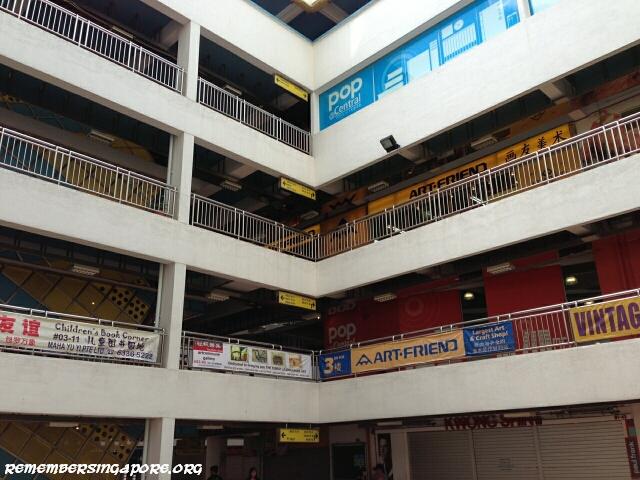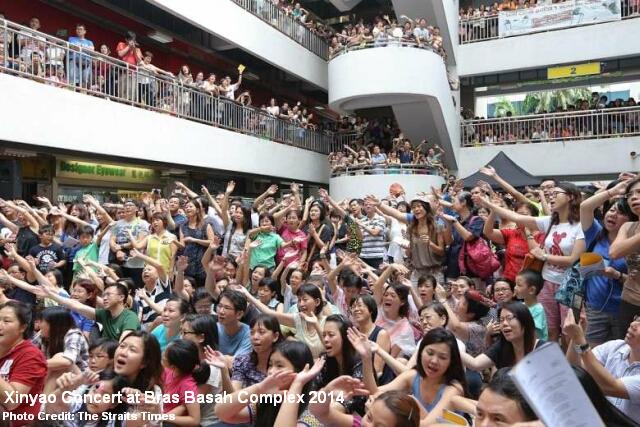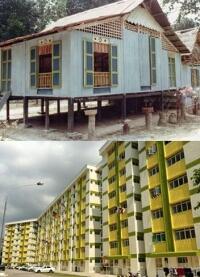
Completed in 1980 under the urban renewal plan, the Bras Basah Complex has been a familiar place to many Singaporeans for the past three decades. Over the years, the commercial-cum-residential complex has become Singapore’s well-known City of Books, an unofficial yet representative name just like the Beach Road’s Army Market, the Arcade where moneychangers ply their trades, or the famous Sungei Thieves Market with their second hand goods.
The Bras Basah Complex is made up of two 25-storey blocks, where the first to fifth floor are catered for commercial purposes and the sixth to 25th level as residential units. The flats are part of an early public housing plan at the downtown area developed by the Housing and Development Board (HDB) in the seventies and eighties, which also include the flats at Selegie Road (Selegie House, built in 1974), Rochor Road (Rochor Centre, 1977), Waterloo Street (Waterloo Centre, 1978) and Queen Street (Cheng Yan Court, 1984).


The origin of the Bras Basah name is disputed. It might be derived from beras basah, which means “wet rice” in Malay. In the early days, boats carrying sacks of rice would unload and dry them along the banks of Sungei Brass Bassa (now Stamford Canal), and the rice would often get wet by the rising tides.
Another saying was that the name came from Sungai Beras Basah, which was originally Parit Singapura, the moat of the ancient fortress city of Kingdom of Singapura. When the kingdom fell in 1398 due to a Majapahit invasion, the last king Parameswara (or Iskandar Shah) fled to Muar, leaving his fortress city in ruins. Beras Basah can be referred as abandoned or discarded items, and Parit Singapura came to be known as Sungai Beras Basah, or abandoned river.

The sale and balloting of the Bras Basah Complex flats were carried out when the buildings were completed in 1980. Under the Home Ownership for the People Scheme, interested Singapore citizens were invited to have a tour of the blocks and residential units before the balloting was officiated by then-Minister for Labour Ong Pang Boon.
The Home Ownership for the People Scheme was launched by the HDB in 1964 to enable low income Singaporeans to buy and own their flats at affordable prices. This would also give the citizens a tangible asset and a stake in the nation building, and foster a sense of identity to the country.

Before the construction of the Bras Basah Complex, the old streets of North Bridge Road, Victoria Street and Bras Basah Road had been traditional venues for book stores, second-hand bookshops and stationery shops. Dozens of such shops were often housed side by side in old shophouses competitively. To the students of the sixties and seventies, it was the go-to place to get the necessary school textbooks and study guides to Shakespeare, poetry and science.
The bookshops at Bras Basah Road probably had its best days in the sixties, when there were strong demands of textbooks from regional countries such as Indonesia and Brunei. The most popular textbooks were those of English literature, history and science. Although the demands from overseas had considerably waned by the seventies, the bookstores continued to have their businesses boosted by the local market.


By the end of July 1982, however, the last of the many bookshops at Bras Basah Road – Educational Book Emporium, S.S. Mubaruk and Brothers and Student’s Books Associates – had to shut down, following the previous lot in their relocation to the new Bras Basah Complex or other available space at North Bridge Road. The old Bras Basah Road shophouses were later demolished.
When the Bras Basah Complex was built, it was designed and designated to be a book centre. The early batches of tenants were contractually obliged to sell books. The early tenants – many of them were the book merchants and bookshop owners from North Bridge Road and Bras Basah Road – formed the Bras Basah Complex Merchant’s Association (BBCMA) in the eighties to work together, protect interest and settle common problems at the newly-built complex.

In mid-1986, the Business Enterprise Committee announced that the HDB had decided to allow the tenants at the complex to change their trades, although most of the tenants, represented by the BBCMA, would prefer at least 80% of the shop space at Bras Basah Complex to be reserved for bookshops. This would uphold the clean and wholesome image of the complex as a “city of books”. Some of the shops, however, later switched to selling of watches, leisure goods and others.

One of Singapore’s oldest bookstores, Shanghai Book Company (上海书局), was previously housed at the Bras Basah Complex between the eighties and late 2000s. Established in 1925 in a High Street double-storey shophouse, it was one of the “big four” pre-war Chinese bookshops in Singapore, which included The Commercial Press (established in 1915), Chung Hwa Book Company (1923) and The World Book Company.
Shanghai Book Company was set up by Chen Yoh Shoo and Wang Shuyang, who came to Singapore after the May Fourth Movement in China. They were also the founders of Hou Chio Public School (後觉公学), a local Chinese school at North Bridge Road that was banned after only three years of operation.

Having survived the Great Depression in the 1930s and the Japanese Occupation, Shanghai Book Company’s heydays came in the fifties and sixties, where it enjoyed brisk business selling large number of books in Chinese, English, Malay and Tamil.
The famous bookshop was patronised by many local Chinese students, even as it shifted from High Street to North Bridge Road and Victoria Street before settling at the Bras Basah Complex. But a shrinking market and declining interest in Chinese books in the eighties changed its fortune. To revive the public interest, Shanghai Book Company initiated a series of exhibitions and book fairs, such as the Bilingual Book Fair in 1983 and an exhibition of Chinese bookmarks in 1985.

But its final chapter eventually arrived in the late 2000s, when Shanghai Book Company was embroiled in internal disputes between its local and China shareholders. Also mired in deep debts, the 83-year-old bookshop had to cease its operation by mid-2009, spelling the end of one of Singapore’s oldest Chinese bookshops.
In February 2016, Bras Basah Complex lost yet another of its long-time tenant in Kaiming Enterprises, when the 77-year-old stationery shop closed due to dwindling business and a retiring owner. Established in 1939, Kaiming Enterprises had supplied stationery to the local and Malaysian markets in the past decades.

In the eighties and nineties, numerous exhibitions, art galleries and cultural performances were held at the atrium of the Bras Basah Complex. In 1989, the HDB upgraded the atrium with a $80,000 fiberglass roof to shelter it from disruptive weather. This was due to the sudden rains that sometimes affected the cultural events such as Chinese painting exhibitions or instrumental performances.
Another event that drew the crowds to the Bras Basah Complex in the eighties was the popular xinyao (Singapore Chinese folk songs) concerts and competitions. Local xinyao singers with their new releases of songs and cassette albums often attracted hundreds of fans, largely made up of students and young adults, that filled up the entire atrium. With the decline of xinyao in the nineties and 2000s, the complex had not witnessed such spectacular scene until 2014, when a two-hour xinyao reunion performance had almost 1,000 fans turned up.

Standing for more than three decades, the Bras Basah Complex has seen some tremendous changes in its surroundings and neighbours, even as it has stayed largely unchanged.
Victoria Street was widened and changed in the eighties from a one-way to a dual-carriageway road. The Empress Hotel was demolished, and the minor roads of Lorong Sidin and Holloway Lane were expunged. The site is now occupied by the new National Library building. On the other side of the Bras Basah Complex, the Odeon Theatre and Bethesda Church were long gone, replaced by the Odeon Towers and Carlton Hotel today.



Published: 23 October 2016
Updated: 28 October 2021









But what is in the Complex today? Are the shops still operating?
The complex is more diversified now, there are F&B shops (Korean BBQ) and others. The book and printing companies have been facing a slowing down in their sector.
I used to enjoy browsing through the bookstores along Bras Basah Road back in the 1970s, during which time i also frequented the National Library and MPH.
Back in the 1970s, i spent most of my after-school hours going through books in the bookstores along Bras Basah Road, the National Library across and MPH as well. So book-crazy i was!
I go Bras Basah Complex about four times every year but not to buy books but to buy stuff related to my guitars and band’s equipment at Swee Lee Music. It’s good to hear that the business is now owned by one of Robert Kuok’s (the richest man in Malaysia) grandsons.
In the 60s, I regularly go to Bras Basah Rd to buy books and stationery.
Is this the same row of shops that use to have wedding dresses for hire? If so my great grand mother owned a Milliner’s shop and she also did wedding flowers in the late 1800s and early 1900s
Had a lot of great memories of the place. This probably known readers here, but the Chinese name for is for Bras Basah Complex is “tower of a hundred victories” (百胜楼). It was so named in order to counter the colloquial name for the complex back in the 1980s, which was “book city” (书城), a homophone for “city of defeat/losing” and was considered way too much bad luck for the owners.
Glad to see they decided to put both names up in the newer sign.
I studied at St Anthony Boy school just opposite from 1983-1989. I used to always go over there and spend the afternoon there in Saint Book Store, a 2nd hand bookshop.
The auntie is also very nice and never chase people away.
Anyone rems at 2nd floor there’s a magic shop at the corner near the circular stair case?
The iconic Music Book Room was closed in end-February 2023, after 43 years at Bras Basah Complex. Situated at level 1, it was one of the first tenants there.
https://www.straitstimes.com/singapore/from-iconic-bookstore-to-popular-coffee-joint-toast-box-replaces-music-book-room-at-bras-basah-complex
The shop of the former Music Book Room has been replaced by Toastbox.